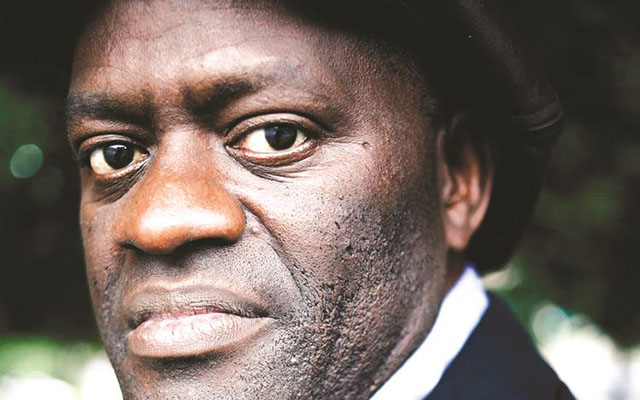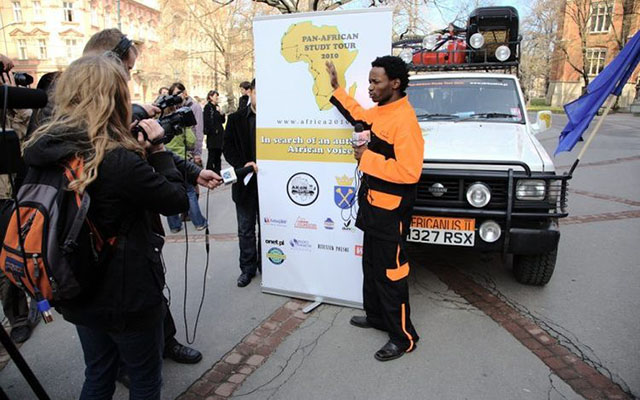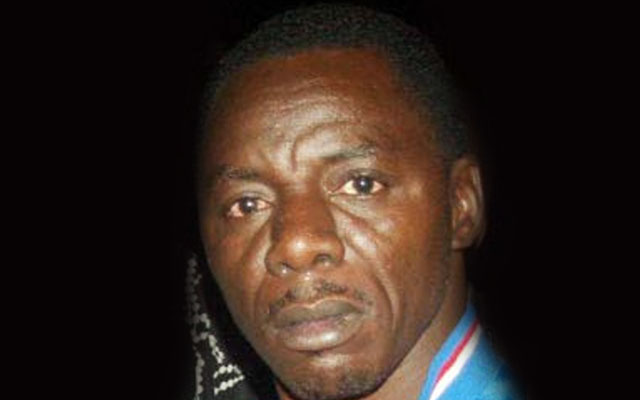Africa out of 2017 Man Booker Prize


Alain Mabanckou
Stanely Mushava Literature Today
Alain Mabanckou, a recurring interest for the flagship panel on translated fiction, has fallen out of the 2017 race for the Man Booker International Prize.
The only African novelist on the longlist this year, Mabanckou was a finalist for his collective body of work in 2015, and prefaced “Tram ’83” which made the “dozen” last year.
This year, the Franco-Congolese’s latest novel, “Black Moses”, was named on the 13-item longlist described by the judges as “compulsively readable and ferociously intelligent”.
Last Thursday, however, the panel announced a shortlist ruling out the Congo-Brazzaville-inspired novel, which has been bracketed with Charles Dickens and Victor Hugo’s coming-of-age strivings, for this year’s title.
Taking forward the Oscar glitterati’s diversity pitch, the Man Booker International panel contrasts this year’s prize with the populist wave currently shaking globalisation by the roots.
“Fiction in translation is flourishing: in these times when walls are being built, this explosion of brilliant ideas from around the world arriving into the English language feels more important than ever,” said Nick Barley, chair of the Man Booker International Prize 2017 panel on the occasion of the longlist.
And the six-item shortlist lives up to the globalist pitch, with two Mideastern authors, one South American and three Europeans, two of them Scandinavians.
Africa defers hope for its first Man Booker International gong to 2018. In 2016, when the prize was first given on the basis of a single work, cutting away from the previous collective arrangement, the continent fielded “Tram ’83” by DRC’s Fiston Mwanza Mujila and “A General Theory of Oblivion” by Jose Eduardo Agualusa, with the latter making it to the finalists.
The Man Booker International Prize is awarded every year for a single novel or short-story collection translated into English and published in the UK.
Translation is equally rewarded, with the £50 000 prize divided between the author and the translator of the winning entry. Shortlisted authors and translators receive £1 000 each.
The 2017 shortlist features Samanta Schweblin (Argentina), Megan McDowell (translator), for “Fever Dream” (Oneworld); Dorthe Nors (Denmark), Misha Hoekstra, “Mirror, Shoulder, Signal” (Pushkin Press); Amos Oz (Israel), Nicholas de Lange, “Judas” (Chatto & Windus); Mathias Enard (France), Charlotte Mandell, “Compass” (Fitzcarraldo Editions); David Grossman (Israel), Jessica Cohen, “A Horse Walks Into a Bar” (Jonathan Cape); and Roy Jacobsen (Norway), Don Bartlett, Don Shaw, “The Unseen” (Maclehose).
These six finalists emerge out of 126 books considered by judges Nick Barley, director of the Edinburgh International Book Festival; Daniel Hahn, an award-winning writer, editor and translator; Elif Shafak, a prize-winning novelist; Chika Unigwe, author of four novels; and Helen Mort, an award-winning poet. Africa’s serial contender, Mabanckou, has been published in 15 languages.
At home in French, his “Blue White Red”, “African Psycho”, “Broken Glass”, “Memoirs of a Porcupine”, “Black Bazaar”, “Tomorrow I Will Be Twenty”, “The Lights of Point Noire” and “Black Moses” are translated into English by Helen Stevenson.
Mabanckou is one of the most important African writers although his work is yet to penetrate the Anglophone world with equal force as the original French.
While he has spent his adult life between France and the US, the last three books return to a childhood in Point Noire, a port city of Congo-Brazzaville (now the Republic of Congo).
His latest offering was originally published in French as “Petit Piment”, which should have directly translated to “Little Pepper” in English. Black Moses and Little Pepper are the troublesome young protagonist’s alternative nicknames.
The action takes place in a Marxist-Leninist Congo of the 1970s, tracing Moses from an orphanage on the outskirts of Pointe-Noire to his sojourn with the band of Congolese Merry Men and Zairean prostitutes at Trois-Cents, ending with his mental illness.
The story of Trois Cents and Mama Fiat 500 which spans the latter half of the novel recurs in his previous books, “Black Bazaar”, “Tomorrow I Will Be Twenty” and “The Lights of Pointe-Noire”.
His memoir, “The Lights of Pointe-Noire”, is probably the closest we come to a glimpse of the novelist at work. An open source masterpiece, “The Lights of Pointe-Noire” is the making of a novel, inviting the reader up close with Mabanckou’s writerly grind and artistic wiring.
Mythic layers of a childhood steeped in superstition and sustained deployment of a composer’s toolkit richly drape the literary autobiography.
Briefly returned to his Congo as a French citizen after 23 years, Mabanckou dusts his closet and raises potent apparitions which make their way into an original, densely stylish memoir.
“I think that I gave ‘The Lights of Pointe-Noire’ to my readers to help them understand where I came from, why I became a writer, and my emotional attachment to Pointe-Noire,” he says in an interview with World Literature Today’s Guuz Kuijer. “Reading the book, you can feel like you have already read all my books: like ‘Tomorrow I Will Be Twenty’, like ‘Broken Glass’ with the people in the bar, like ‘Memoirs of a Porcupine’…” In fact, reading the book, you feel you want to read all of Mabanckou’s books.
“After my return, for the first two weeks people were happy, but beginning with the third week they were asking me, ‘When are you going back?’ Because they didn’t want me to stay. If you stay in the country you left for 20 years, they’re going to think that you returned as a failure. So they say, ‘Go back to America so we can be proud to explain to people that our native son is living in the United States’,” he explains.
During his absence, his parents have died, a new generation has sprung up that shares his blood, and a lot has been reconfigured in unsettling political and cultural upheavals.
And now close relatives are warding off mortal illnesses while the rest of the family comes to terms with their evolving conditions.
Mabanckou, now a world-famous writer, happens into this company with a lot to catch up on and a lengthy absence to explain.
They fasten on him with different motivations, from demands for money, and even his clothes, to filial joy. Only a book-length unwind can account for these changes. Mabanckou rakes up every site of nostalgia in his native Pointe-Noire in-between family reunions and culture talks.
The site visits correspond with a childhood story but also with the writer’s footprint. He enacts the story of his life onstage but also leaves the door open backstage.
He despairs at the grip of perfectionism, “tearing out pages from time to time, for the slightest crossing out”.
“As though the past were a straight line, like a wave, unmoving, unruffled by the wind’s caprice.” Sometimes, the neat revision does not stand up as a faithful retrieval of his childhood. He must dash into the kitchen at his French Institute and rummage in the little bin for what he threw there the previous day.
When it is time to leave again, his bag is so stuffed up with ruffled sheets, he imagines being intercepted for espionage.
For him, writing is an end apart – the novelist does not have to dream up the cause behind the craft. “A few ‘budding writers’, as they like to call themselves here, dropped ‘Why do you write?’ I was beginning to feel rather tired, and said the first thing that came into my head: ‘I don’t know why I write, perhaps that’s why I tear out pages I’ve already scribbled on, and throw them in the bin.
‘I know I have no choice, I’ll go and retrieve them the next morning write them again. It doesn’t matter how long it takes, as long as one day the book’s finished.’ They laughed at that, but I didn’t. Particularly since my bin right now is filled with crumpled pages,” reads the return of the nerd.
Mabanckou is a writer who speaks to young ambition, a notable tendency for someone of his accomplishment.
Few years ago, he organised a literary festival for the Republic of Congo to fire up his writerly compatriots with the conviction that the world is at their doorstep.
In 2008, at a Malian literary festival, Mabanckou was approached by a teenager with his own handwritten copy of the Franco-Congolese’s “Broken Glass”.
“As Mabanckou autographed the boy’s manuscript, one could not help but observe the tears welling up in their eyes, each one recognising something in the other, something that could not be spoken at that point, words that would only come later in ‘Tomorrow I’ll be Twenty’, ‘The Lights of Pointe-Noire’, and ‘Petit Piment’ (Black Moses),” writes Guuz Kuijer.
A multiple prize winner, the Congolese Sapper turns one into a motivational speaker in as much time as Paul would have turned Agrippa into a Christian.
His success shows that background is not a measure of possibility, an important message for young African artists in this day of global connectography.
The Man Booker International Prize is taking the message of diversity to the highest level of intellectual engagement, somewhat vindicating Ngugi waThiongo’s crusade against the centre.
Hopefully, translations from African languages will make the 2018 dozen, seeing as there are new incentives to enhance the indigenous intellectual record without foregoing global recognition.
The 2017 winner will be announced on June 14 in London.
Feedback: [email protected]







Comments